Day 3 Paraty
On Day 3, I attended a mix bag of sessions. The first session celebrated the poems of Drummond. In the next session Stephen Greenblatt and James Shapiro, shared their love of Shakespeare. Later in the day, Granta provided the space for two British writers to reflect on what being British means. Two Middle Eastern writers and poets talked a little about the issues for writers in Syria and Lebanon and finally Jonathan Frazen in his slow but thoughtful presentation reflected on what he makes of American culture and why he thinks we should all become bird watchers.
Drummond the modern poet was explored by Alcides Viillaca and Antonio Carlos Seechin.
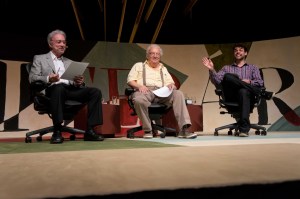
Alcides Viillaca began reading the long and evocative poem The Elephant. The poem is about the creation or manufacture of an elephant from a few materials, feather, and cotton and then something unexpected occurs spirituality is present in the eyes of the elephant. Alcides, said in a world that no longer believes in animals Drummond, daily, would be able to create his elephant as a symbol of a sensitive body looking for friends or absolute love.
Antonio Carlos Seechin chose the 13th poem from A Rosa do Povo, which is a small sonnet of 11 verses called Aporo. It’s about an insect trying to find its way. It finds an Orchid and through the use of language is transformed. Apora means green Orchid, but also an insect that digs. Similar to the Elephant the poet emerges on paper. Seechan said Drummond was not at home in the world. He later left the modernist movement and flirted with Communism. He was shy with a ferocious intelligence but wanted to share his emotions through his poems. He illustrated this with the poem ceramics. The poem describes the breaking and putting together of a cup. Put back together it is a strange cup, weird in shape but still a cup, one that hides in the cupboard but wants to be a cup in the world.
Shakespeare’s World – Stephen Greenblatt and James Shapiro agreed on their love of Shakespeare but approach their research in different ways. There is not a lot know about Shakepeare’s life and they suggested this in some ways was both intentional and inevitable. Shakepeare was a Catholic in a time when Protestantism was coming to the fore in England. Politics were fraught with violence. When Shakespeare wrote Henry V people understood what that meant because they had relatives who were required to fight for King/Queen and Country.
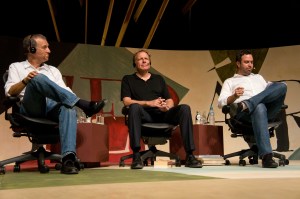
The great debate of who wrote Shakespeare is what they focused on. They explained why Frued did not believe that Shakespeare wrote Shakespeare. Shapiro believes it was because of Frued’s own Oedipus complex. His father had not long died and he could not see how Shakespeare could have written Hamlet without going through the experience of losing a father. Shakespeare’s father was still living when Hamlet was written. Freud favoured the Earl of Oxford as being the writer of Hamlet and other plays.
Greenblatt explained why Shakespeare was silent about his politics, not least because Shakespeare must have seen what happens to those who speak out against those who have power. The ritual of beheaded and the head then being put on a stake on the walls of London Tower was a constant reminder. But as a playwright Shakespeare did not avoid his beliefs. In Hamlet, purgatory, a catholic belief is vividly recalled in the ghost’s appearance. Both writers believe that Shakespeare collaborated with other writers, notably Peel who helped write Titus Andronicus Shakespeare constantly plagiarised other writers, much to their annoyance. He was a much better writer and often changed the plays to take out the element, the motive, that made sense. He made money and wanted to be wealthy but died before benefitting from all his wealth. His daughter who lived to a very old age also did not reveal the biographical details that researchers want, so they have to invent the social scene and extract the context and what might have been his thinking.
Granta’s new magazine looks at British society through the eyes of writers. Two of these writers, Andrea Stuart and Cynan Jones were interviewed by John Freeman from Granta. They both explained their Britishness and their feelings of not quite fitting the stereotypical media generated concept of Beckham, royalty cream teas and cricket. Cynan said the Welsh have a strong connection to landscape and place, but Wales is often seen as an industrial world that plays Rugby. Andrea expressed her frustration and at times anger at the British ability to ignore the painful past of slavery and the riches made by Sugar colonialists. Her book traces her ancestry from 1627 when the British landed in Barbados and began to clear the land to make it tame and to look like England. Cynan said Wales and Scotland have not been tamed in that way it is rough around the edges.
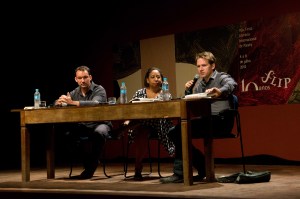
Cynan read from his novel “The Dig” which is about a Badger. His books have been well received, with playwright and author Andrew Davies saying of his novel “The long dry” “it’s the best f*****ng book I have read this year actually”. Andrea read a powerful passage from her book Sugar in the Blood and she explained how hard she had worked to try and get the right words, the right language, to build the right picture of her family’s heritage. In the late 1640s, Andrea Stuart’s earliest known maternal ancestor set sail from England, lured by the promise of the New World, to settle in Barbados where he fell by chance into the lucrative life of a sugar plantation owner.With George Ashby’s first crop, the cane revolution was underway and would go on to transform the Caribbean into an archipelago of riches, establishing a thriving worldwide industry that bound together ambitious white entrepreneurs and enslaved black workers. Andrea Stuart follows the thread of her own family’s involvement with sugar through
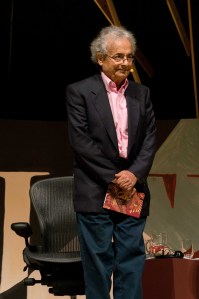
successive generations, telling a story of insatiable greed and forbidden love, of abuse and liberation
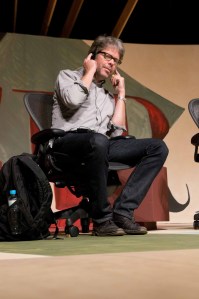
.
